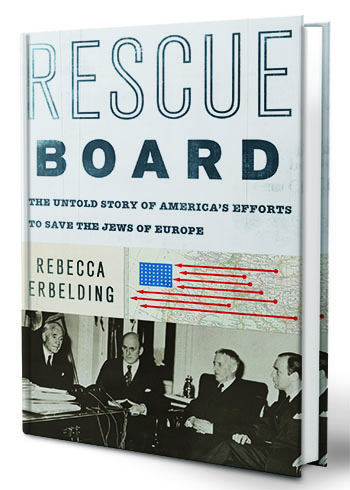
By Rebecca Erbelding. 384 pp. Doubleday, 2018. $30.
FROM APRIL 1933—when Hitler’s government issued its first anti-Jewish law—until early 1944, the United States government did virtually nothing to aid those persecuted by the Nazis. An anti-immigration majority in Congress in the 1930s and a need to devote all available funds and materiel to pursuing the war once the U.S. had entered arguably made American silence defensible.
But on January 22, 1944, after a Treasury Department report showed that the State Department had been actively suppressing news of the Holocaust, President Franklin D. Roosevelt set up the War Refugee Board (WRB). Many dismissed the board’s efforts as “too little and too late,” and the WRB worked in such shadowy ways that its impact is hard to measure. However, within its 21 months of existence, the board helped save hundreds of thousands of those targeted for Nazi extermination. With a broad mandate and the freedom to function independently, it was an effort that has never been tried before or since then.
It is also an effort that some historians have highlighted as a subject in need of scholarly attention. Rebecca Erbelding, an archivist at the U.S. Holocaust Memorial Museum and co-curator of its latest exhibit, “Americans and the Holocaust” (reviewed at right), heeded their call, and chose the WRB as the topic of her doctoral research. Rescue Board is a readable version of her dissertation.
Erbelding quotes historian Yehuda Bauer’s assessment that what made the WRB unique was that it was “officially permitted to break practically every important law of a nation at war in the name of outraged humanity.” The board worked on a number of fronts, from conducting psychological warfare on those who took part in the exterminations, warning of dire consequences, to funneling money to anti-Nazi allies in Europe—among them, Raoul Wallenberg, the Swedish diplomat who helped thousands of Jews escape occupied Hungary. It also helped falsify papers for those in danger of deportation, transport escapees to safe havens, and set up top-secret ransom negotiations with Kurt Becher, the Nazi commissar of all concentration camps.
Erbelding has mined storehouses of public and private records, and tells the stories of the WRB’s exploits—its successes and failures—in a clear and compelling way. While some readers might find the book too painstakingly detailed, it is a must-read for those looking for answers in the renewed debate over whether the U.S. should have taken stronger steps to stem the Holocaust. —Washington, DC-based writer Daniel B. Moskowitz is a frequent contributor to World War II.





